- Home
- Norman Mailer
The Fight Page 16
The Fight Read online
Page 16
But then Ali must have come to a first assessment of assets and weaknesses, for he made — somewhere in the unremarked middle of the round — he must have made a decision on how to shape the rest of the fight. He did not seem able to hurt Foreman critically with those right-hand leads. Nor was he stronger than Foreman except when wrestling on his neck, and certainly he could not afford any more of those episodes where he held onto Foreman even as George was hitting him. It was costly in points, painful, and won nothing. On the other hand, it was too soon to dance. Too rapid would be the drain on his stamina. So the time had come to see if he could outbox Foreman while lying on the ropes. It had been his option from the beginning and it was the most dangerous option he had. For so long as Foreman had strength, the ropes would prove about as safe as riding a unicycle on a parapet. Still what is genius but balance on the edge of the impossible? Ali introduced his grand theme. He lay back on the ropes in the middle of the second round, and from that position he would work for the rest of the fight, reclining at an angle of ten and twenty degrees from the vertical and sometimes even further, a cramped near-tortured angle from which to box.
Of course Ali had been preparing for just this hour over the last ten years. For ten years he had been practicing to fight powerful sluggers who beat on your belly while you lay on the ropes. So he took up his station with confidence, shoulders parallel to the edge of the ring. In this posture his right would have no more impact than a straight left but he could find himself in position to cover his head with both gloves, and his belly with his elbows, he could rock and sway, lean so far back Foreman must fall on him. Should Foreman pause from the fatigue of throwing punches, Ali could bounce off the ropes and sting him, jolt him, make him look clumsy, mock him, rouse his anger, which might yet wear Foreman out more than anything else. In this position, Ali could even hurt him. A jab hurts if you run into it, and Foreman is always coming in. Still, Ali is in the position of a man bowing and ducking in a doorway while another man comes at him with two clubs. Foreman comes on with his two clubs. In the first exchange he hits Ali about six times while Ali is returning only one blow. Yet the punches to Ali’s head seem not to bother him; he is swallowing the impact with his entire body. He is like a spring on the ropes. Blows seem to pass through him as if he is indeed a leaf spring built to take shock. None of his spirit is congested in his joints. Encouraged by the recognition that he can live with these blows, he begins to taunt Foreman. “Can you hit?” he calls out. “You can’t hit. You push!” Since his head has been in range of Foreman’s gloves, Foreman lunges at him. Back goes Ali’s head like the carnival boy ducking baseballs. Wham to you, goes Ali, catapulting back. Bing and sting! Now Foreman is missing and Ali is hitting.
It is becoming a way to fight and even a way to live, but for Ali’s corner it is a terror to watch. In the last thirty seconds of this second round, Ali hits out with straight rights from the ropes fast as jabs. Foreman’s head must feel like a rivet under a riveting gun. With just a few seconds left, Foreman throws his biggest punch of the night, an express train of a left hook which leaves a spasm for the night in its passing. It has been a little too slow. Ali lets it go by in the languid unhurried fashion of Archie Moore watching a roundhouse miss his chin by a quarter of an inch. In the void of the effort, Foreman is so off-balance that Ali could throw him through the ropes. “Nothing,” says Ali through his mouthpiece. “You have no aim.” The bell rings and Foreman looks depressed. There has been premature desperation in that left. Ali shakes his head in derision. Of course that is one of Ali’s basic tricks. All through his first fight with Frazier he kept signaling to the crowd that Joe failed to impress him. All the while Ali was finding himself in more trouble.
14. THE MAN IN THE RIGGING
IT SEEMS LIKE eight rounds have passed yet we only finished two. Is it because we are trying to watch with the fighters’ sense of time? Before fatigue brings boxers to the boiler rooms of the damned, they live at a height of consciousness and with a sense of detail they encounter nowhere else. In no other place is their intelligence so full, nor their sense of time able to contain so much of itself as in the long internal effort of the ring. Thirty minutes go by like three hours. Let us undertake the chance, then, that our description of the fight may be longer to read than the fight itself. We can assure ourselves: It was even longer for the fighters.
Contemplate them as they sit in their corners between the second and third rounds. The outcome of the fight is not yet determined. Not for either. Ali has an enormous problem equal to his enormous confidence. Everybody has wondered whether Ali can get through the first few rounds and take Foreman’s punch. Now the problem has been refined: Can he dismantle Foreman’s strength before he uses up his own wit?
Foreman has another problem; he may not be as aware of it as his corner. There is no fear in his mind that he will fail to win the fight. He does not think about that any more than a lion supposes it will be unable to destroy a cheetah; no, it is just a question of catching Ali, a maddening frustration. Still the insult to his rage has to worry his corner. They can hardly tell him not to be angry. It is Foreman’s rage after all which has led him to knock out so many fighters. To cut it off is to leave him cowlike. Nonetheless he must contain his anger until he catches Ali. Otherwise he is going to wear himself out.
So Sadler works on him, rubs his breasts and belly, Sadler sends his fingers into all the places where rage has congested, into the meat of the pectorals and the muscle plating beneath Foreman’s chest, Sadler’s touch has all the wisdom of thirty-five years of Black fingers elucidating comforts for Black flesh, sensual are his fingers as he plucks and shapes and shakes and balms, his silver bracelet shining on his Black wrist. When Sadler feels the fighter is soothed, he begins to speak, and Foreman takes on the expression of a man whose head is working slowly. He has too much to think about. He spits into the bowl held before him and nods respectfully. He looks as if he is listening to his dentist.
In Ali’s corner, Dundee, with the quiet concern of a sommelier, is bringing the mouth of the adhesive-taped water bottle to Ali’s lips, and does it with a forefinger under the neck so the bottle will not pour too much as he tips it up. Ali rinses and spits with his eyes off on the serious calculation of a man weighing grim but necessary alternatives.
Joe Frazier: “George is pounding that body with shots. He’s hurting the body. Ali shouldn’t stay on that rope.… If he don’t move or cut George, George will walk him down. He need to move. He don’t need to stay on that rope. For what reason’s he on the rope?” Frazier sounds offended. Even the sound of the word worries him. Joe Frazier would consider himself gone if he had to work there. Rope is an ugly and miserable kuntu.
Jim Brown replies: “Ali is punishing George Foreman even though he’s on the rope. He’s getting some tremendous blows in and” — the wisdom of the professional football player — “at some point that can tell.”
The bell. Once more Ali comes out of the corner with a big and threatening face as if this round for certain he will bring the attack to Foreman and once again sees something wrong in the idea, profoundly wrong, shifts his plan instantly, backs up and begins to play the ropes. On comes Foreman. The fight has taken its formal pattern. Ali will go by choice to the ropes and Foreman will chase him. Now in each round Ali will work for thirty or forty seconds or for so much even as a minute with his back no more than a foot or two from the top rope, and he is on the rope as often as not. When the strength of the mood, or the logic of the clinch suggests that the virtue of one set of ropes has been used up, he will back off across the ring to use another set. He will spend on an average one-quarter of each round on each of the four sides of the ring. He might just as well be drawing conscious strength from the burial gods of the North, the West, the East and the South. Never has a major fight been so locked into one pattern of movement. It appears designed by a choreographer who knows nothing about the workings of legs and is endlessly inventive about arms. The fight goes
on in exactly this fashion round after round, and yet it is hardly boring, for Ali appears in constant danger, and is, and is not. He is turning the pockets of the boxing world inside out. He is demonstrating that what for other fighters is a weakness can be for him a strength. Foreman has been trained to cut instinctively from side to side in such a way as to spoil Ali’s ability to circle, Foreman has learned how to force retreat to the ropes. But Ali makes no effort to get away. He does not circle, neither does he reverse his circle. Instead he backs up. Foreman’s outstretched arms become a liability. Unable to cuff at a dancing target, he must probe forward. As he does, Ali keeps popping him with straight lefts and rights fast as karate strokes. But then Ali’s wife has a black belt in karate.
Sooner or later, however, Foreman is always on him, leaning on him, banging him, belting away with all the fury George knows how to bring to the heavy bag. Ali uses the ropes to absorb the bludgeoning. Standing on one’s feet, it is painful to absorb a heavy body punch even when blocked with one’s arms. The torso, the legs and the spine take the shock. One has to absorb the brunt of the punch. Leaning on the ropes, however, Ali can pass it along; the ropes will receive the strain. If he cannot catch Foreman’s punches with his gloves, or deflect them, or bend Foreman’s shoulder to spoil his move, or lean away with his head, slip to the side, or loom up to hug Foreman’s head, if finally there is nothing to do but take the punch, then Ali tightens his body and conducts the shock out along the ropes, so that Foreman must feel as if he is beating on a tree trunk which is oscillating against ropes. Foreman’s power seems to travel right down the line and rattle the ring posts. It fortifies Ali’s sense of relaxation — he has always the last resort of composing himself for the punch. When, occasionally, a blow does hurt, he sticks Foreman back, mean and salty, using his left and right as jabs. Since his shoulders are against the ropes, he jabs as often with his right as his left. With his timing it is a great jab. He has a gift for hitting Foreman as Foreman comes in. That doubles or triples the force. Besides he is using so many right jabs Foreman must start to wonder whether he is fighting a southpaw. Then comes the left jab again. A converted southpaw? It has something of the shift of locus which comes from making love to a brunette when she is wearing a blond wig. Of course, Ali has red wigs too. At the end of the round, Ali hits Foreman with some of the hardest punches of the fight. A right, a left, and a right startle Foreman in their combination. He may not have seen such a combination since his last street fight. Ali gives a look of contempt and they wrestle for a few seconds until the bell. For the few extra seconds it takes Foreman to go to his corner, his legs have the look of a bedridden man who has started on a tour of his room for the first time in a week. He has almost stumbled on the way to his stool.
In the aisle, Rachman Ali began to jeer at Henry Clark. “Your man’s a chump,” Rachman said. “Ali’s going to get him.” Clark had to look worried. It was hardly his night. First his own fight had been postponed, then called off, now he was watching George from a crate in the aisle. Since he had a big bet on George, this last round offered its woes.
In the corner Sadler was massaging Foreman’s right shoulder and George was gagging a bit, the inside of his lips showing a shocking frothy white like the mouth of an overgalloped horse.
Nonetheless, he looked lively as he came out for the bell. He came right across the middle of the ring to show Ali a new kind of feint, a long pawing movement of his hands accompanied by short moves of his head. It was to a different rhythm as if to say, “I haven’t begun to show what I know.”
He looked jaunty, but he was holding his right hand down by the waist. Fatigue must have lent carelessness to what he did, for Ali immediately answered with an insulting stiff right, an accelerating hook and another right so heavy to Foreman’s head that he grabbed for a clinch, first time in the fight. There, holding on to Ali while vertigo collided with nausea, and bile scalded his breath, he must have been delivered into a new awareness, for George immediately started to look better. He began to get to Ali on the ropes and hit him occasionally, and for the first time in a while was not getting hit as much himself. He was even beginning to jam a number of Ali’s rhythms. Up to now, whenever Ali took a punch, he was certain to come off the ropes and hit Foreman back. A couple of times in this round, however, even as Ali started his move, George would jam his forearm into Ali’s neck, or wrestle him to a standstill.
All the while Ali was talking. “Come on, George, show me something,” he would say. “Can’t you fight harder? That ain’t hard. I thought you was the Champion, I thought you had punches,” and Foreman working like a bricklayer running up a pyramid to set his bricks would snort and lance his arms in sudden unexpected directions and try to catch Ali bouncing on the rope, Ali who was becoming more confirmed every minute in the sinecure of the rope, but at the end of the round, Foreman caught him with the best punch he had thrown in many a minute, landing just before the bell, and as he turned to leave Ali, he said clearly, “How’s that?”
It must have encouraged him, for in the fifth round he tried to knock Ali out. Even as Ali was becoming more confident on the ropes, Foreman grew convinced he could break Ali’s defense. Confidence on both sides makes for war. The round would go down in history as one of the great rounds in Heavyweight boxing; indeed it was so good it forged its own frame as they battled. One could see it outlined forever in lights: The Great Fifth Round of the Ali-Foreman fight!
Like much of greatness, the beginnings were unremarked. Foreman ended the fourth round well, but expectation was circling ringside that a monumental upset could be shaping. Even Joe Frazier was admitting that George was “not being calm.” It took John Daly to blurt out cheerfully to David Frost, “Ali is winning all the way for me and I think he’s going to take it within another four rounds!”
Foreman didn’t think so. There had been that sniff of victory in the fourth, the good punch which landed — “How’s that?” He came out in the fifth with the conviction that if force had not prevailed against Ali up to now, more force was the answer, considerably more force than Ali had ever seen. If Foreman’s face was battered to lumps and his legs were moving like wheels with a piece chipped out of the rim, if his arms were beginning to sear in the lava of exhaustion and his breath come roaring to his lungs like the blast from a bed of fire, still he was a prodigy of strength, he was the prodigy, he could live through states of torture and hurl his cannonade when others could not lift their arms, he had been trained for endurance even more than execution and back in Pendleton when first working for this fight had once boxed fifteen rounds with half a dozen sparring partners coming on in two-round shifts while Foreman was permitted only thirty seconds of rest between each round. He could go, he could go and go, he was tireless in the arms, yes, could knock down a forest, take it down all by himself, and he set out now to chop Ali down.
They sparred inconclusively for the first half-minute. Then the barrage began. With Ali braced on the ropes, as far back on the ropes as a deep-sea fisherman is braced back in his chair when setting the hook on a big strike, so Ali got ready and Foreman came on to blast him out. A shelling reminiscent of artillery battles in World War I began. Neither man moved more than a few feet in the next minute and a half. Across that embattled short space Foreman threw punches in barrages of four and six and eight and nine, heavy maniacal slamming punches, heavy as the boom of oaken doors, bombs to the body, bolts to the head, punching until he could not breathe, backing off to breathe again and come in again, bomb again, blast again, drive and steam and slam the torso in front of him, wreck him in the arms, break through those arms, get to his ribs, dig him out, dig him out, put the dynamite in the earth, lift him, punch him, punch him up to heaven, take him out, stagger him — great earthmover he must have sobbed to himself, kill this mad and bouncing goat.
And Ali, gloves to his head, elbows to his ribs, stood and swayed and was rattled and banged and shaken like a grasshopper at the top of a reed when the wind whips, and the
ropes shook and swung like sheets in a storm, and Foreman would lunge with his right at Ali’s chin and Ali go flying back out of reach by a half-inch, and half out of the ring, and back in to push at Foreman’s elbow and hug his own ribs and sway, and sway just further, and lean back and come forward from the ropes and slide off a punch and fall back into the ropes with all the calm of a man swinging in the rigging. All the while, he used his eyes. They looked like stars, and he feinted Foreman out with his eyes, flashing white eyeballs of panic he did not feel which pulled Foreman through into the trick of lurching after him on a wrong move, Ali darting his expression in one direction while cocking his head in another, then staring at Foreman expression to expression, holding him in the eye, soul to soul, muntu to muntu, hugging his head, peeking through gloves, jamming his armpit, then taunting him on the edge of the ropes, then flying back as Foreman dove forward, tantalizing him, maddening him, looking for all the world as cool as if he were sparring in his bathrobe, now banishing Foreman’s head with the turn of a matador sending away a bull after five fine passes were made, and once when he seemed to hesitate just a little too long, teasing Foreman just a little too long, something stirred in George like that across-the-arena knowledge of a bull when it is ready at last to gore the matador rather than the cloth, and like a member of a cuadrilla, somebody in Ali’s corner screamed, “Careful! Careful! Careful!” and Ali flew back and just in time for as he bounced on the ropes Foreman threw six of his most powerful left hooks in a row and then a right, it was the center of his fight and the heart of his best charge, a left to the belly, a left to the head, a left to the belly, a left to the head, a left to the belly, another to the belly and Ali blocked them all, elbow for the belly, glove for the head, and the ropes flew like snakes. Ali was ready for the lefts. He was not prepared for the right that followed. Foreman hit him a powerful punch. The ringbolts screamed. Ali shouted, “Didn’t hurt a bit.” Was it the best punch he took all night? He had to ride through ten more after that. Foreman kept flashing his muscles up out of that cup of desperation boiling in all determination, punches that came toward the end of what may have been as many as forty or fifty in a minute, any one strong enough to send water from the spine to the knees. Something may have finally begun to go from Foreman’s n’golo, some departure of the essence of absolute rage, and Ali reaching over the barrage would give a prod now and again to Foreman’s neck like a housewife sticking a toothpick in a cake to see if it is ready. The punches got weaker and weaker, and Ali finally came off the ropes and in the last thirty seconds of the round threw his own punches, twenty at least. Almost all hit. Some of the hardest punches of the night were driven in. Four rights, a left hook and a right came in one stupendous combination. One punch turned Foreman’s head through ninety degrees, a right cross of glove and forearm that slammed into the side of the jaw; double contact had to be felt; once from the glove, then from the bare arm, stunning and jarring. Walls must begin to crack inside the brain. Foreman staggered and lurched and glared at Ali and got hit again, zing-bing! two more. When it was all over, Ali caught Foreman by the neck like a big brother chastising an enormous and stupid kid brother, and looked out to someone in the audience, some enemy or was it some spiteful friend who said Foreman would win, for Ali, holding George around the neck, now stuck out one long white-coated tongue. On the other side of the ropes, Bundini was beaming at the bell.

 Ancient Evenings
Ancient Evenings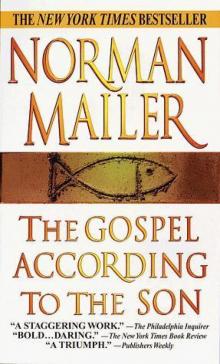 The Gospel According to the Son
The Gospel According to the Son Oswald's Tale: An American Mystery
Oswald's Tale: An American Mystery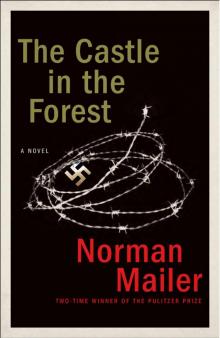 The Castle in the Forest
The Castle in the Forest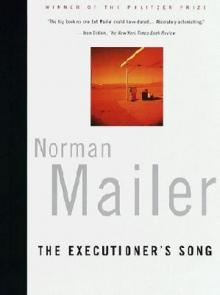 The Executioner's Song
The Executioner's Song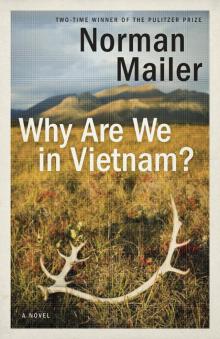 Why Are We in Vietnam?
Why Are We in Vietnam?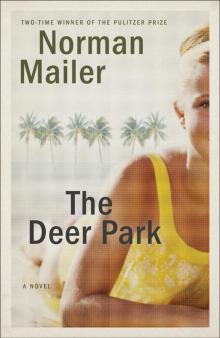 The Deer Park: A Play
The Deer Park: A Play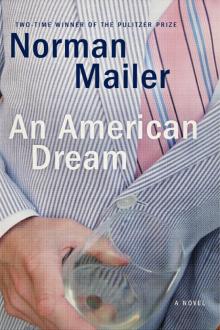 An American Dream
An American Dream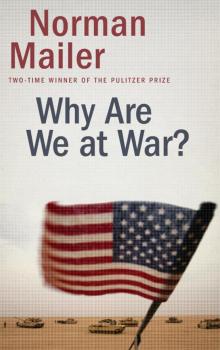 Why Are We at War?
Why Are We at War?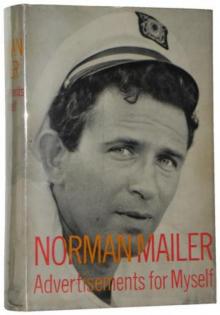 The Time of Her Time
The Time of Her Time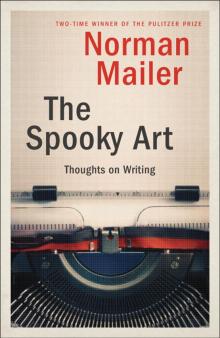 The Spooky Art: Thoughts on Writing
The Spooky Art: Thoughts on Writing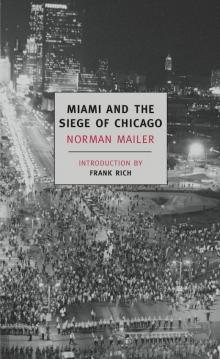 Miami and the Siege of Chicago
Miami and the Siege of Chicago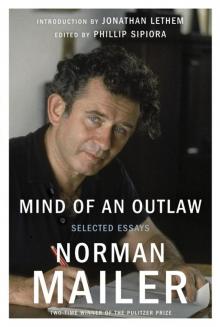 Mind of an Outlaw: Selected Essays
Mind of an Outlaw: Selected Essays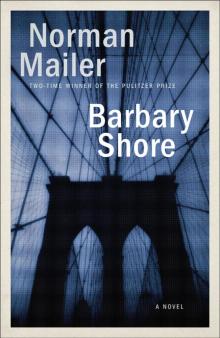 Barbary Shore
Barbary Shore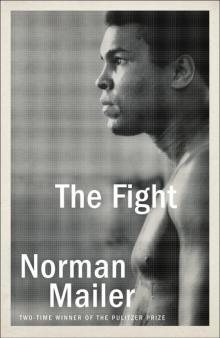 The Fight
The Fight Harlot's Ghost
Harlot's Ghost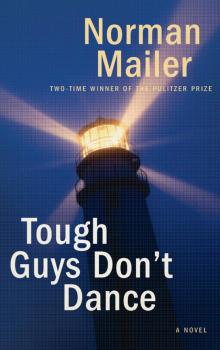 Tough Guys Don't Dance
Tough Guys Don't Dance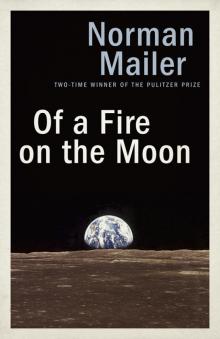 Of a Fire on the Moon
Of a Fire on the Moon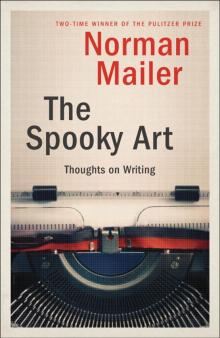 The Spooky Art
The Spooky Art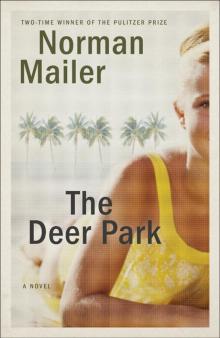 The Deer Park
The Deer Park On God: An Uncommon Conversation
On God: An Uncommon Conversation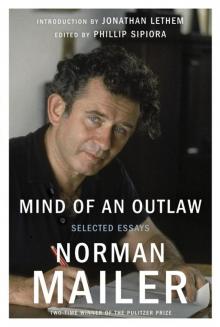 Mind of an Outlaw
Mind of an Outlaw Oswald's Tale
Oswald's Tale